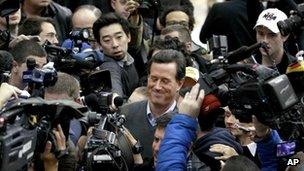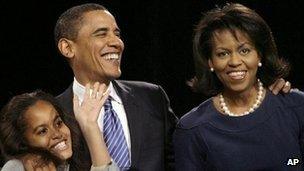Q&A: US primaries and caucuses
- Published

Media outlets from across the world convene in Iowa to document the events
The route to a spot on the ballot in November's US presidential election runs through a series of electoral contests known as primaries and caucuses.
This is the process by which supporters of the Democratic and Republican parties, in each US state, determine which candidate they would like to represent their party in the presidential poll.
How does it work?
Why did Iowa and New Hampshire come first?
What is Super Tuesday?
The BBC's Franz Strasser travelled through Iowa to talk to voters about their concerns heading into the state's caucus in January.
Caucus or primary - what's the difference?

Barack Obama's victory in Iowa showed he could compete among rural white voters
Are the caucuses and primaries held at the same time every election year?
Is a long nomination contest a bad thing?